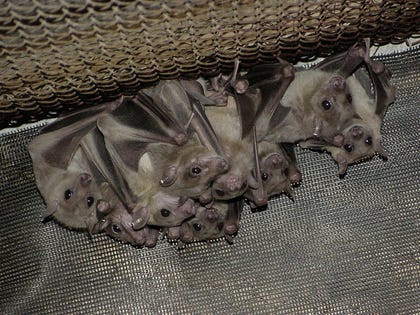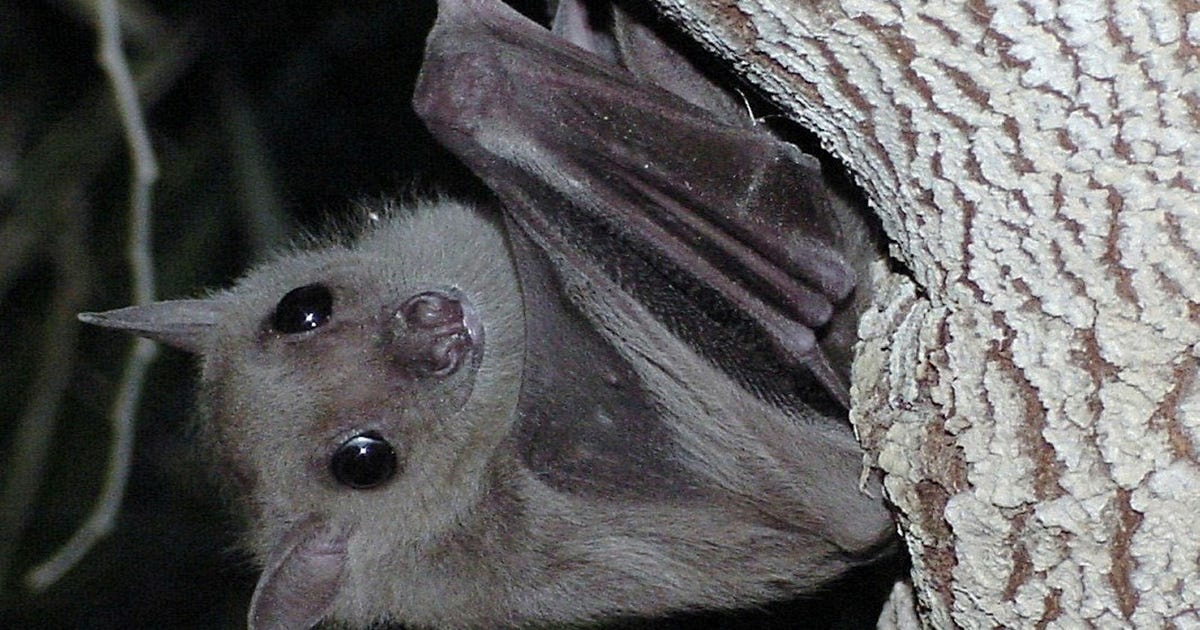What will we do with a drunken fruit bat?
What will we do with a drunken fruit bat?
What will we do with a drunken fruit bat?
Put him back in the lab.
That’s because the poor thing is lost. Egyptian fruit bats do not normally imbibe. Many species have been observed consuming fermenting fruit and staggering about incoherently, but in nature, this aviating animal is a teetotaler. On a personal level, that’s probably because ethanol tastes awful – and that’s the alcohol produced in fermenting fruit. On an evolutionary level, though, the abstemious bat might be onto something.

 Close
Close
Egyptian fruit bats. Not pictured: slurred echolocation and questionable flight paths. Credit: Francisco Sánchez
Egyptian fruit bats. Not pictured: slurred echolocation and questionable flight paths. Credit: Francisco Sánchez
And yet, the prestigious Ig Nobel Prize in the category of Aviation has now been awarded to Carmi Korine and Berry Pinshow of Ben-Gurion University, along with their former students Francisco Sánchez and Mariana Melcón, for their landmark study on how atypical drunkenness affects the behavior of Egyptian fruit bats (Rousettus aegyptiacus), published in Behavioral Processes (ScienceDirect) in 2010.
Haaretz WeeklySpecial episode: What you need to know about Trump’s new Israel-Gaza peace plan | with Amir Tibon
play
Haaretz Weekly
Special episode: What you need to know about Trump’s new Israel-Gaza peace plan | with Amir Tibon
Volume: 0.5
1X
total– : –time0:00
fast forward15
play
rewind15
Clearly, neither the drunken fruit bat nor the Ig Nobel Committee, which operates under the aegis of the Annals of Improbable Research magazine, moves in haste.
So: How do you get a bat drunk when it doesn’t like alcohol? It’s all about the choices, isn’t it.
Having figured that out, the researchers could begin asking the important questions. Such as, do drunken bats fly straight? Do they get into accidents, collide with one another or a tree and giggle? Do inebriated micromammals slur their squeaks?
Related Articles
The world got its answer back in 2010 – and is now being reminded thanks to Marc Abrahams and the Ig Nobel foundation, which rewards researchers who “makes people laugh, then makes them think”.
Ben-Gurion University believes this is the first-ever Ig for its people. Well done! Their people say that they were “absolutely chuffed” when they got the news of the Ig, which came out of the blue.
Close
Egyptian fruit bats in their natural, non-wobbly state. Credit: Francisco Sánchez
Egyptian fruit bats in their natural, non-wobbly state. Credit: Francisco Sánchez
“At first, we were a little dubious that we were being had,” Berry Pinshow told Haaretz by phone, not least because so long had passed since that paper came out. But being scientists, they could research the thesis that they had won – and a letter from Abrahams, editor of AIR, settled their doubts. “Then we were elated,” Pinshow adds.
He and co-lead author Carmi Korine couldn’t make the ceremony, but their ex-students happily attended on behalf of the team to accept the honor on September 18.
No, Pinshow has no idea who proposed them for the Ig. They did ask. “Marc Abrahams couldn’t remember or didn’t want to,” he says.
The research itself was born during the annual BGU course on desert bat ecology. The team’s null hypothesis was that fruit containing more than 1% ethanol (shown to be toxic to bats) would cause inebriation that would impair their flight and echolocation skills, much like alcohol does to our parallel skills (walking, talking). So, did it?
Way hay and up he rises
Let us be clear: Ethanol is toxic and all fruits are fated to end in a reeking brew. The riper (or more rotten) the fruit, the higher its ethanol content. Some love that vibe, but other studies have shown that the Egyptian fruit bat is absolutely not more attracted to fermenting fruit than fresh fruit, even if the stank travels farther.
Other research has shown that the more rotten a fruit, the lower its nutritive value. So eating rotting fruit would do the bat no favors anyway.
Close
More Egyptian fruit bats. Their drunkeness is “comparable to unsafe, erratic driving for a person on the road and slurring their speech.” Credit: Francisco Sánchez
More Egyptian fruit bats. Their drunkeness is “comparable to unsafe, erratic driving for a person on the road and slurring their speech.” Credit: Francisco Sánchez
Why would the team test this, then? Don’t all animals that don’t normally consume alcohol get affected when they do? And wasn’t it recently reported that the only creature not affected was – of course – the Oriental hornet (yay team Entomology)?
That was indeed reported, but Pinshow puts the hornet’s status into perspective.
“First of all, we have no idea whether all vertebrates are sensitive to alcohol – we can assume it because we have a lot in common, but it has never been shown in all ~20,000 species of birds, ~40,000 species of fish and 10,000 mammals,” he points out, rounding out all figures.
Some insects will sip fermenting nectar and get drunk, he adds. But also: “I don’t know, or think anybody has looked at alcohol in amphibia or reptiles.”
Haaretz hasn’t either. But based on our research into the matter, all science has to say is that humans shouldn’t get drunk before going swimming with crocodiles, though the one can certainly lead to the other. The question has arisen whether crocodiles get inebriated by eating drunken humans. It has not been satisfactorily answered with scientific rigor.
Meanwhile, knowing that these bats scorn rotting fruit, the team nonetheless caused their Egyptian fruit bats to consume fermenting juice (mango, fresh, delicious, without filthy preservatives) and sent them flying down an indoor corridor.
Close
A bat feasts on guava in India in 2006, blissfully unaware it may one day be part of a drunken flight study. Credit: Tarun Das / AP
A bat feasts on guava in India in 2006, blissfully unaware it may one day be part of a drunken flight study. Credit: Tarun Das / AP
So, did it affect them? It sure did. Male Egyptian fruit bats, intoxicated at a level that would get their driving licenses revoked if they had cars, flew significantly slower and made more turns compared with bats who ate normal food, the paper showed.
And the ladies? The team didn’t test them, not wanting to get into a sticky wicket with reproductive issues, etc.
The drunken bats’ squeaking was also impaired, the scientists deduced. This refers to their hallmark double-click echolocation sounds, which in the case of the Egyptian fruit bat is used to echolocate around the cave – not to hunt. Fruit doesn’t flee into the night.
So what have we? Bats that normally do not indulge in the demon drink, but have it imposed on them, stagger around the sky, or corridor ceiling, and slur their double clicks.
“It’s comparable to unsafe, erratic driving for a person on the road and slurring their speech,” Pinshow says. “They’re not functioning correctly. And if you’re not a correctly functioning bat, you’ll lose your flying license and get zapped by a predator.” Now we know.

